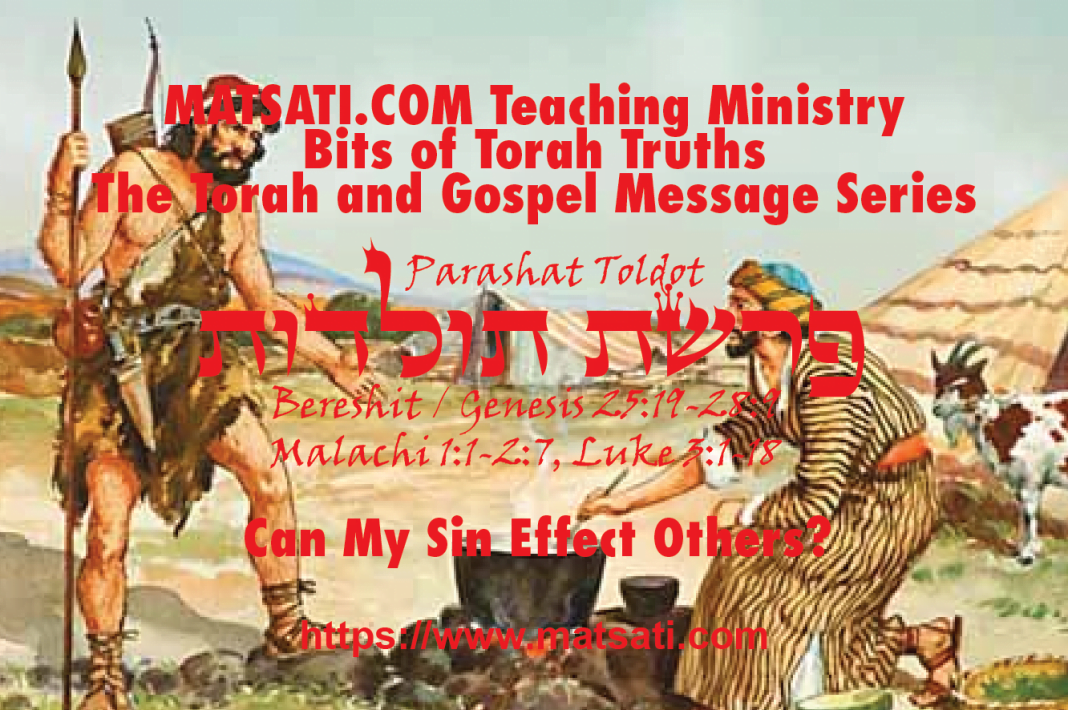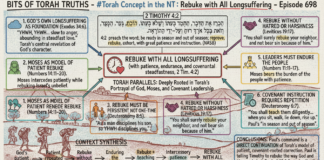This is a touchy subject, asking the question of whether the sins of the husband may affect the health of one’s spouse or children? I have in the past seen families suffer from cancer for example, where an entire church is praying for a wife, and healing doesn’t come. The question is always asked “why” and nobody knows or some other reason may be given. A lot of times people will say “you still have sin in your life that causes this” blaming the person with the cancer and people just glare or look at you as if something is wrong with you spiritually. The question that is never asked or spoken about is in relation to what we read in this week’s Torah portion in the conversation between Abimelech and Isaac. In this week’s Torah portion Isaac lies about his wife saying she is his sister. When Abimelech finds out he responds in the following way saying, 26:10 Abimelech said, ‘What is this you have done to us? One of the people might easily have lain with your wife, and you would have brought guilt upon us.’ (NASB, י וַיֹּאמֶר אֲבִימֶלֶךְ מַה-זֹּאת עָשִֹיתָ לָּנוּ כִּמְעַט שָׁכַב אַחַד הָעָם אֶת-אִשְׁתֶּךָ וְהֵבֵאתָ עָלֵינוּ אָשָׁם:) Take note of the Hebrew text which states וְהֵבֵאתָ עָלֵינוּ אָשָׁם using the plural pronominal suffix referring to all of Abimelech’s people. The context in which he speaks, he says “One of the people might easily have lain with your wife, and you would have brought guilt (אָשָׁם) upon us.” He didn’t speak specifically about himself doing this but of someone else from his people. The context has him referring to either himself or one of his people sinning causing guilt to come upon all of them. The concept being put forward here is to collective punishment, a form of punishment that effects all of the community due to the perpetrator’s family member, friend, acquaintance, sect, or neighbor causing the punishment of a group of people who often have no direct association with the individual or control over their actions. The Torah portion this week is teaching us how the sins of others may affect the community in which one lives. King David wrote, “The world was built with grace/chesed” (Tehillim / Psalms 89:2). The foundation of God’s love is chesed (grace) as it is revealed to us in the life of Yeshua the Messiah. (1 Corinthians 3:11) This coupled to the very first mitzvah (commandment) given to mankind, פְּרוּ וּרְבוּ (p’ru ur’vu) meaning “be fruitful and multiply,” simply speaking, this means we are to create families which become a picture of nurturing communities based on grace (chesed) that are God centered. Based upon the first commandment in the Torah, the communities that were created through procreation had a very close relationship because of the nature of siblings and family, mom and dad, brother and sister, etc. The NT perspective teaches us how the family is to be centered on Yeshua the Messiah who led the way for His people to walk in God’s Ways. He revealed to us the proper interpretation to live in the kingdom of God. The point is on the question of how individual sins affect others? When a person sins does his or her sin effect the entire community, congregation, family, or marriage. This ultimately comes down to how the Lord God deals with peoples, families, and nations, on a corporate basis due to an individual’s behavior. I am not necessarily speaking of physical abuse in the sense that a husband verbally abuses, is manipulative, controlling, or other forms of selfish anger (including relationship passivity and neglect). I am thinking about hidden sins. Is it possible, as in the example given above, that one’s spouse being afflicted with the disease of cancer could be for the purpose of drawing the other spouse nearer to the Lord in repentance and turning from sin? On the individual who is sinning, take David as an example. David was living in sin. He did not confess his sins, and his lack of confession began to take a toll on his body. Physical atrophy is one of the effects of sin. In David’s situation, repentance led to physical restoration. This led to his writing Tehillim / Psalms 32:3-4 “Blessed is the man against whom the Lord counts no iniquity, and in whose spirit there is no deceit. For when I kept silent, my bones wasted away through my groaning all day long. For day and night, your hand was heavy upon me; my strength was dried up as by the heat of summer.” Note how David’s hidden sin led to the death of his baby. David’s hidden sin also led to the breaking down of his kingdom. The point is, like David, if sin is affecting one’s health, one can repent and find restoration. If the sin of someone else is affecting one’s health, he or she is at the mercy of that person owning up to and removing the sin from his or her life. Do you think this is possibly why some prayers are not answered? In marriages with an abusive spouse who does not repent, this is a situation that leaves the victim to deal with the consequences of someone else’s sin. Sin is always affecting us in atrophic ways. We are in a constant degenerate condition because of sin. Paul called it wasting away according to 2 Corinthians 4:16 So we do not lose heart. Though our outer nature is wasting away, our inner nature is being renewed day by day. (NASB) Paul speaks of those who have faith in the Lord and who are applying God’s Word to their lives. The Word of God in our lives has the effect of renewal and restoration, just as Paul wrote to the Ephesians how the Word of God has a washing effect. (Ephesians 5:26) God is merciful. Though we have created this problem of sin, life, and death, the Lord does not leave us alone. He always provides a way of escape when sin is tempting our lives (1 Corinthians 10:13). If these things are true, if the hidden sin of a husband or wife can affect another family member, this is a very high calling to be weary of the consequences of continual sin. This is not a popular approach (or answer) for those who are suffering from diseases. This is however a sobering call to self examination! What we do know by what we learn from the Torah is when people or groups of people (a community), even a single family (See Joshua 6) when rebelling against God’s command are punished, and the punishment may occur even multi-generationally. In Joshua 6 we read how Achan sinned and the punishment fo Achan was to be stoned to death as well as his sheep, other livestock, his wife and his children. Everything he owned was destroyed, burned in the fire. This is a powerful testimony for us today which functions as a warning. The bottom line is that sin effects all of those around us. Abimelech recognized this and was upset with Isaac because he had lied. Those whom we love the most are those closest to us and they will suffer the consequences the most. This is why it is so important that we take sin very seriously. Sin brings down God’s wrath and may also fall upon on those around us if we are unrepentant. This is why the author of the book of Hebrews wrote in Hebrews 10:26 If we deliberately go on sinning after we have received the knowledge of the truth, no further sacrifice for sins remains, 10:27 but only a fearful expectation of judgment and raging fire that will consume all adversaries. (NASB) Without repentance and actively turning from sin seeking the help of the Lord, there is only the fearful expectation of judgement and raging fire just as the author of Hebrews is writing. There are times when the Lord God is required to deal with an entire people due to the sin of an individual. There are also times when the Lord God must deal with an entire family due to the sin of an individual. The model of the family draws out this point on whether an individual’s sin may cause harm to come upon a family member through the mechanism of the Lord calling one back to repentance. The bottom line is that sin effects all of those around us. Abimelech recognized this and was upset with Isaac because he had lied. What we find here is the tension of the Hebraic mind-set with two aspects of the divine activity of God in our lives which represents the promise and the threat. The emphasis on either the promises or the threat of destruction is based upon the circumstances. It is difficult to sort out the reasons for corporate punishment. The collective punishment on the one hand is used by God on occasion under special circumstances. On the other hand, there are Torah commands that we are not to make the sons responsible for their father’s sin while other statements have the Lord God visiting the sins of their fathers to the third and fourth generation. The point is that children, even families are victims of the natural consequences of their father’s guilt. The tension that we see in the Scriptures is for the purpose of always keeping us on our toes, to be aware of the consequences of our sins and not to disregard them as non-consequential. Understanding this principle helps us to further recognize that the sins of those around us and our own personal sins may have horrible consequences. The Lord God Almighty will deliver judgement in this life in the form of discipline for our sins, even to the second and the third generation. We should take this very seriously. We should be very thankful of what it says in Bamidbar / Numbers 14:18, “The Lord is slow to anger, abounding in love and forgiving sin and rebellion.” The Lord God allows a period of time for us to repent, to turn from our sinful ways, and to seek Him in His Word, and His Messiah Yeshua. We are not to consider God’s mercy where He allows time for us to repent as the Lord not seeing or caring. Our calling is to repent and turn from sin with God’s help!









